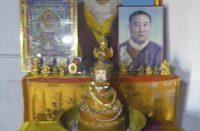
High Peaks Pure Earth is starting off 2019 with the English translation of a blogpost by Woeser that continues her long series about the Cultural Revolution in Tibet. Last year we published seven parts and this is the eighth.
Originally written for the Mandarin service of Radio Free Asia, this post was published on Woeser’s blog on May 8, 2018 and contains more personal reflections perhaps than the others in this series as it mainly focuses on her father Tsering Dorje who had been in the People’s Liberation Army.
The spark for Woeser’s long series of posts about the Cultural Revolution was this New York Times interview.
“I Really Don’t Want You To Be In the PLA”: An Interview That Made Me Continue to Think About the Cultural Revolution in Tibet – Part 8 By Woeser
At the end of the New York Times interview, Luo Siling asked me a question that is very important to me: if you father were still alive, how do you think would he look at your book and your work on human rights in Tibet? How would he look at the Cultural Revolution in Tibet?
My father never directly talked to me about the Cultural Revolution, but in my memory, he did not like it, perhaps because he was pushed aside. Just like I wrote in “Forbidden Memory”: “…when the Revolutionary Committee was first established, Zeng Yongya, the commander of the ‘rebel faction’-friendly Tibet Military District, became its head. For a moment, the internal struggle between the factions went the “Rebels’” way and over one hundred supporters of the “Great Alliance Command”, including my father, were gradually driven out. In early 1970, my father was transferred to the Department of the People’s Armed Forces in some county of Kardze Autonomous Prefecture in Sichuan Province. He thus left Lhasa with his wife and children. However, he could never forget Lhasa. 20 years later, he once again took his family back to the place that had captivated him so much–Lhasa. Only over one year later, he sadly and unexpectedly fell sick and died an early death. He was buried in the “Memorial Grounds” located in the western suburbs of Lhasa. Many of his fellow villagers with whom he had joined the army were also buried there as well as Red Guards who died in the armed struggle during the Cultural Revolution.”
I have already talked about how much my father loved photography. I often thought that if he had not become a soldier, he would have chosen to become a photographer. But fate made him a life-long soldier and a life-long hobby photographer. But fate also brought his photography and me together and so: the photographs that had been buried at the bottom of a box were almost waiting for me to be discovered and used as clues to understand the history of Tibet and result in the book “Forbidden Memory: Tibet During the Cultural Revolution.”
If my father were still alive, he would probably not be happy about the history and present state of Tibet, he would criticise it, but would he approve of my points of view, my writing or the path I have chosen? I am really not sure. I remember how he, when he was still alive, often reminded me to “walk on two roads;” it means that I can walk the road that I myself have chosen, but that I should also walk the road that society and my environment has paved; one leg walks on my own road, the other on the road that most people walk on. I asked him back if one leg might perhaps break? But he never replied. I once wrote a poem entitled “Betrayal” which goes as follows (I have actually rewritten and amended it many times, the following version can be considered as the latest one):
I seem to have betrayed him
Seem to be further and further away from his wish
Is it like that? It’s not like that, is it?
I usually do not think much about this question
I usually have a set of reasons that come from the heart
I even believe that perhaps he might be pleased
That I wrote book after book
That I got the fame of being a writer that he yearned for in his dreams
I even turned his photographs into an album
Perhaps I am his pride in this world
But is it like that? Would he really think like that?
Perhaps it is exactly the opposite, perhaps he is grieved
So I started to write the story of my family
Have been writing it for ten years, but not yet finished it
I wanted to start it with: My dear father
I really don’t want you to be in the
Chingdrol Magmi … …
“Chingdrol Magmi”, like “Sha Jie” (Sar Jie, 杀劫, the Chinese title of “Forbidden Memory”), is a newly invented Tibetan term; it means People’s Liberation Army. But no matter whether I have betrayed him or not, I am truly thankful to and deeply love my father.
Life is complicated and cannot easily be reduced to a few words. For me, it is perhaps a bit like poet Derek Walcott wrote: “I who am poisoned with the blood of both, Where shall I turn, divided to the vein? I who have cursed the drunken officer of British rule, how choose between this Africa and the English tongue I love? Betray them both, or give back what they give? How can I face such slaughter and be cool? How can I turn from Africa and live?”





Follow Us!